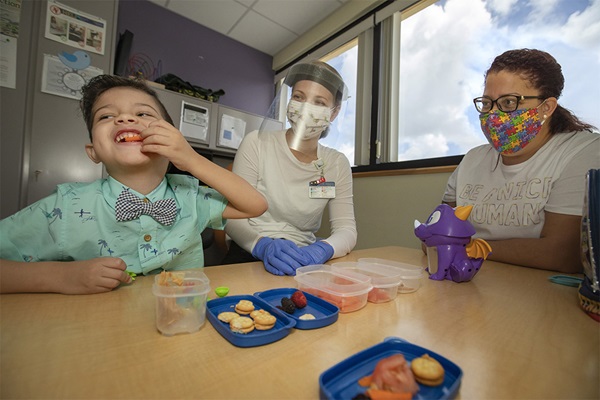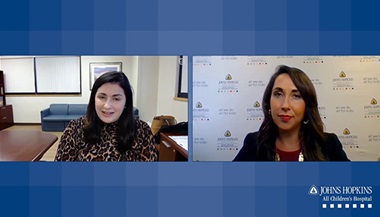Patient Story
Autism: Gabriel's Story

Patient Story Highlights
- Gabriel had communication, feeding, and texture hypersensitivity disorders at 18 months
- Identifying and addressing these disorders required tailored therapy sessions and family involvement
- Gabriel's progress has been significant and he now engages in conversation and performs better in daily life, thanks to the patience and expertise of his therapists and family support.
At 18 months, Gabriel wouldn’t eat solid food, drank only small amounts of formula and wouldn’t speak a single word. Falling behind in developmental milestones for children his age, his pediatrician recommended he be evaluated for communication, feeding disorders and texture hypersensitivity.
“Pediatric feeding and swallowing issues are extremely complex,” says Therese Montanari, M.S., CCC-SLP, director of the Speech-Language and Feeding Department at Johns Hopkins All Children's Hospital’s Child Development and Rehabilitation Center. “Children have unique needs and are not always able to communicate the specific symptoms they may be experiencing.”
Montanari cautions there are many red flags of feeding and swallowing problems in children and infants that may include:
- Poor weight gain or growth
- Poor intake
- Coughing, gagging or choking during feeding
- Arching, crying, pulling away or other signs of discomfort during feeding
- Refusing food or liquid
- Limited acceptance of certain textures
- Difficulty chewing
- Significant family struggles at mealtime
- Recurring pneumonia or respiratory infections
Identifying a child’s difficulties through a speech, language or feeding evaluation is only the first step and there is rarely a swift cure. Recurring therapy sessions require tailored modification unique to each child and their ability to reach incremental goals.
“Family involvement is essential,” says Montanari of the value in reinforcing at home the exercises taught to both children and parents at therapy.
“I understood as a mother that there was a lot to be done in order to help Gabriel with his overall development,” recalls Gabriel’s mother, Cherry, of his feeding and speech therapy sessions that began as a toddler in March 2017.
As Gabriel grew, his physicians diagnosed him with Level 1 or high functioning autism — the mildest level of ASD, Cherry says. “This explained certain situations we experienced as a family. He might experience a tantrum that not even he knows why. Or just want to eat pizza for a month and then not like it. Being a mom of a high functioning autistic child can be overwhelming, but also very rewarding and, at times, even fun.”
Watching the dapper 5-year-old chomping on carrots, cheese crackers, dried fruit and peanut butter today, you’d never know that behind his checkered bow tie was a child who vomited at nearly every feeding session and frequently cried until it was time to go home. “They never minded his tantrums or vomit,” says Cherry of the incredible patience she has witnessed in her son’s therapists.
“Gabriel’s journey is one of many triumphs,” says Melisa Workman, M.S., CCC-SLP. “He started speech and language therapy as a sweet little boy who loved others but had not yet learned how to engage and use his voice. The exuberant young man who now walks through my door avidly engages others in conversation.”
“Follow-through from Gabriel’s family has been such a staple in his success,” says Barbara Hancock, M.S., CCC-SLP, after a recent feeding therapy session where she incorporated tasting new foods with diverse textures into common board games. Cherry and “Miss Barbara” are no match for Gabriel today who is eager to win even if it means crunching down on a freeze-dried raspberry – a task that only months ago would have had a non-winning outcome.
“The therapists always find a way to engage him,” Cherry says. “For me, the little things are great accomplishments. Wearing sandals, touching or tasting a new food, drinking water without a straw, or even getting a simple haircut. His speech is more and more meaningful every day. He expresses wants and needs and understands more of what is expected from him. Gabriel is performing much better on his daily life,” says Cherry with pride.
“All Children’s therapists gave us understanding to deal with Gabriel’s needs as a family and the hope that he will one day be a great scholar. This center is our second home and the staff our new family.”
Speech-Language and Feeding Services at Johns Hopkins All Children's Hospital
The Speech-Language and Feeding program at Johns Hopkins All Children’s Hospital in St. Petersburg, Florida, helps children develop the skills needed for successful communication, feeding and swallowing. These skills can affect all aspects of daily life, from communicating basic needs, to developing social skills, to progress in school.


